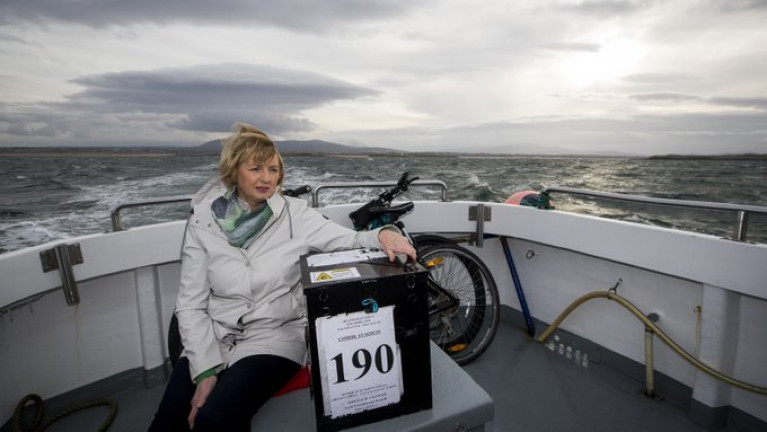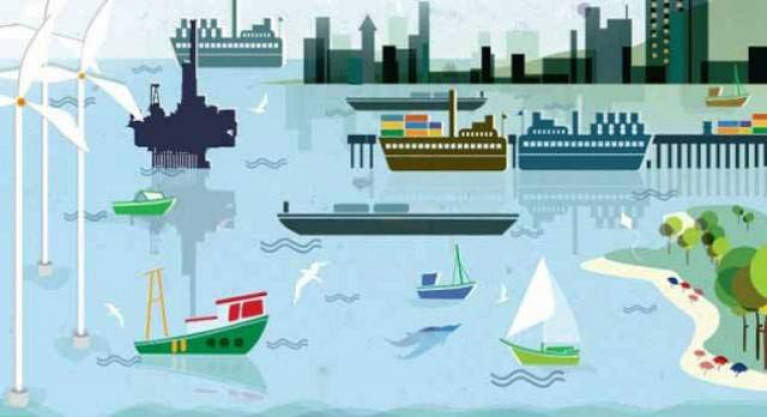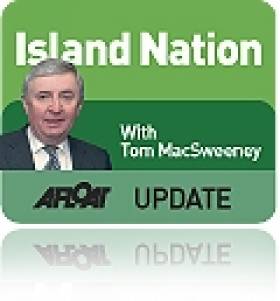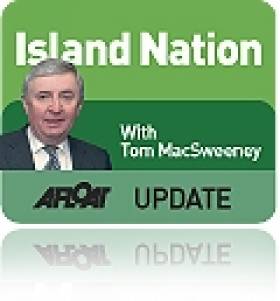Displaying items by tag: General Election
First Ballots Cast by Islanders In General Election
On islands off the coasts of Galway, Mayo and Donegal, people are casting their votes in the General Election today.
It had been expected that the European and local elections held in May of last year would be the final time that islanders would vote ahead of the rest of the country.
However, legislation to allow islanders vote on the same day as other voters, despite having gone through second stage in the Dáil, had not been passed by the time the General Election was called.
Traditionally islanders voted ahead of the rest of the country to ensure that bad weather did not hamper the return of ballot boxes to the mainland in time for the count.
For more RTE News reports.
Where is the Dedicated Department for Ireland's 'Vast Marine Potential' in General Election 2020 Pledges?
You come across many references in this General Election 2020 to Ireland as an 'island nation' – the 20th largest island in the world in fact – but what are our politicians genuinely doing about this 'vast maritime potential'?
This island nation still doesn't have a marine policy or a dedicated marine department. It’s a ship of state without a captain or a rudder.
It adds insult to injury to discover that this same island nation was moved to the verge of bankruptcy just a decade years ago after her inhabitants turned their backs on the ocean and invested too heavily in the land.
So much for living in a smart economy.
Not many people living in Ireland realise that it’s the third biggest country in Europe, by virtue of her seabed territory of 220 million acres.
But there are 'no votes in boats' as the old saying goes so do our politicians genuinely care about the marine?
A good place to find out might be the 2020 General Election party manifestos? Afloat has done a trawl through these manifestos searching for the word 'marine'.
The manifestos can be accessed in the links below and the numbers in brackets denote the numbers of times the word 'marine', is mentioned.
- Fine Gael (22)
- Fianna Fáil (3)
- Sinn Féin (4)
- Labour (8)
- Green Party (8)
- People-Before Profit (0)
Department of Marine Broken up
After the 2007 general election, responsibility for the marine was broken up over five departments. Today confusion reigns, and there are at least six departments involved.
The Department of Agriculture, Food and the Marine has responsibility for the Irish fishing fleet, but Communications, Energy and Natural Resources is responsible for some other aspects of fisheries – drift nets, for example.
The Naval Service and its fleet – which in turn monitors fishing – comes under the Department of Defence. But the marine leisure section, responsible for our fleet of 27,500 recreational craft – where did that go? The Marine Industry Federation found that the leisure section was missing and put out its own alert, but it hasn’t been located yet.
If you want to build a marina, to cater for the growing Irish leisure boating fleet, you need to apply to the Department of the Environment. But other water sports activities come under the Department of Transport, Tourism and Sport.
The Department of Transport, which would have no transport to deal with at all if it wasn’t for the ships that bring in fuel to this country, doesn’t refer to “marine” in its title, but it has a marine division.
This is the department containing the Irish Coast Guard management that at one point wanted to close the coastal radio stations at Valentia and Malin Head.
Ocean Wealth
Today, there is some hope of an awakening to Ireland’s vast maritime potential with the progress of Fine Gael's Harnessing Our Ocean Wealth: An Integrated Marine Plan for Ireland. When launched the then Minister for Agriculture, Food and the Marine Simon Coveney even went as far as to admit that we had “turned our backs on the sea”.
The Fine Gael Government’s new marine plan was a welcome commitment but progress has been glacially slow, especially since Coveney's own departure from Agriculture House.
It is also unfortunate that the opportunity to integrate the management of Ireland’s maritime activities within a dedicated department with a single brief has been passed over in favour of an interdepartmental marine co-ordination group. One look at Canada, where a similar plan was implemented, shows how development can be impeded by separate departments talking over each other.
When everyone is responsible, then no one is.
Surely a single department to manage the sector is a prerequisite? Not so according to the manifestos.
Fine Gael has a dedicated section to the marine sphere in its manifesto (pages 79-80) and some thought has been given to reviewing what progress has been made to Ireland’s first marine spatial plan and framework, enacting the Marine Planning and Development Management Bill, exploiting offshore renewable potential, as well as developing supporting investment in our ports and Marine Tourism. FG say: 'As an island nation, with almost half of all Irish people living within five kilometres of the coastline, we have a strong maritime tradition and affinity with these. Fine Gael has prioritised the marine and introduced the first-ever blueprint for the development of the marine sector, Harnessing Our Ocean Wealth'.
Fianna Fáil says it is committed to protecting our coastal and fishery communities. It will review the Sea-Fisheries and Maritime Jurisdiction Act and it says it will introduce an ‘Oceans Act’ to protect Ireland’s seas while working at an EU level to achieve the establishment of ambitious 2030 targets. FF also say they will increase Marine Institute funding by €3m to boost research and 'prioritise traditional coastal fishing communities'.
Sinn Fein makes the point that rural communities have suffered disproportionately as a result of the failed policies of successive Fianna Fáil and Fine Gael Governments but there is little else on the marine in its manifesto.
The Green Party says it will designate 50% of Irish territorial waters as Marine protected areas to heed the advice of the Ecologist E.O. Wilson that half of the natural world needs to be protected in this way. The selection and management of the areas will be informed and combined with a major scientific survey, assisted by all relevant state agencies, of the changes that are taking place in the North West Atlantic due to climate change.
The Labour Party will set up maritime conservation zones to allow Irish fish stocks to recover and also to protect Irish waters from overfishing post-Brexit. This will require enhanced NavalService resources for enforcement.
Top Irish offshore sailor Liam Coyne from the National Yacht Club in Dun Laoghaire is standing as a Social Democrats Candidate in the Dublin South Central constituency in this month's General Election.
Coyne, a married father of three young children who lives in Dublin 12, where he also runs a small business, shot to sailing fame in August 2014 when he and co-skipper Brian Flahive won the double-handed division of the Round Britain and Ireland race, earning an Afloat Sailor of the Month award in the process. Read the full account of their marathon voyage here.
Now his sights are firmly focussed on politicial horizons. He kicked off his campaign reiterating the Social Democrat’s dedication to their core values and he dismisses suggestions party will do deal to keep FG/Labour in power. 'We're not in it for Mercs and perks', he says.
What a load of Rubbish @alankellylabour I challenge you come canvassing in Dublin SC and see if it's a issue #ge16 https://t.co/BpzR04dT9F
— Liam Coyne (@liamcoynes) February 4, 2016
According to the Social Democrats website, Coyne is passionate about fairness and dignity for people, and his experience running a business means that he is very aware of the importance of quality employment for workers’ dignity and standard of living. He is also a recent law graduate having undertaken his studies during the evening over the past few years.
More on his election campaign here
Will Election Promises Be Delivered On?
Fine Gael can, logically from the support which the party garnered in the General Election, be expected to dominate a Coalition Government. In that context, the question arises as to whether they will deliver on their pre-election manifesto commitment to re-establish the Department of the Marine?
The promise to do so was unequivocal, a clear undertaking that the situation created by the former Fianna Fail and Green Party Coalition which had decimated maritime issues by spreading them over several Departments of State, would be changed and all would be contained in one Department.
In the event of a Coalition being formed will we hear that "circumstances" have changed and adjustments must be made in the context of Coalition arrangements?
I had the opportunity to question Joan Burton of the Labour Party, one of the party negotiators, prior to the election at an event organised by the European Association of Journalists. She accepted that politicians had not paid enough attention to the marine sphere and said that this attitude should be changed and accepted that the nation could benefit economically as a result.
I hope that I am not being overly cynical towards politicians, born of long years of journalistic experience, in fearing that pre-election promises may be subjected to change.
• This article is reprinted by permission of the EVENING ECHO newspaper, Cork, where Tom MacSweeney writes maritime columns twice weekly. Evening Echo website: www.eecho.ieMarine Department Promised, First America's Cup Capsize, Whales and Sailing Oil Tankers
I am reflecting this week on a varied list of maritime issues which have arisen in my writings on marine topics.
Following recent pieces I wrote about the attitude of political parties in the General Election towards the marine sector, I had a telephone call from a senior Fine Gael politician and, lo and behold, the party included the marine sector in its manifesto, pledging to restore the Department of the Marine, abolished by Fianna Fail. I await post-election developments with interest.
It has been a good week for those interested in protection of whales and dolphins. Hundreds of dolphins were spotted off the Old Head of Kinsale, apparently following shoals of herring and sprat on which they were feeding.
In the Antarctic the Japanese whaling fleet was forced to give in to pressure to stop culling. The Japanese have killed hundreds of whales every year, claiming this was for "scientific purposes," even though it has been identified worldwide as for human consumption. The fleet was ordered home by its Government after increasing international pressure.
The Irish Whale and Dolphin Group published its annual report this week. It was formed in December 1990, dedicated to the "conservation and better understanding" of cetaceans - whales, dolphins and porpoise - in Irish waters through "study, education and interpretation." IWDG turnover in 2010 was around €300,000. It has dealt with up to 10,000 queries a month for information on its website. A total of 92 strandings of 128 individual cetaceans was reported to the IWDG in 2010. This compares to 137 strandings of 169 animals for 2009.
This week oil prices rose because of the unrest in Libya and David Surplus, Chairman of B9 Energy Britain's largest windfarm operator, warned that sooner or later oil will run out. BP is examining the possibility of building a fleet of carbon-neutral, wind-powered sail ships planned, to carry world trade.
On the international sailing scene the new AC 45, forerunner of the next generation of America's Cup boats was launched in New Zealand and had its first capsize. The wing-sailed catamaran is designed for speed and close racing, capable of making up to 30 knots, while intended to be handled in tight, tactical courses. An exciting boat to sail, it will also be very testing of ability. The first capsize of the new boat occurred on Auckland's Hauraki Gulf, hit by what was described as "a freak gust of wind," while the crew were doing maintenance on board before a sailing test.
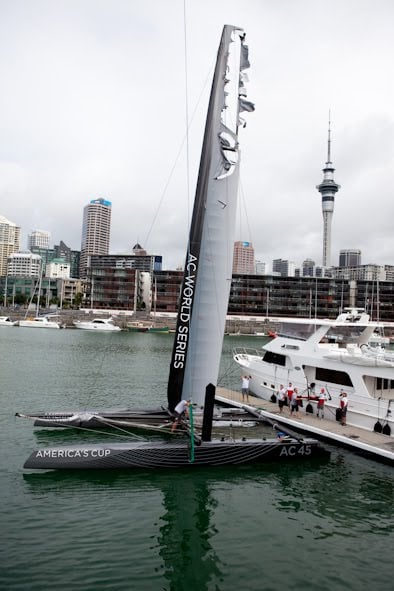
Back in dock after the capsize
It capsized fully, ending upside down. Three support vessels were needed to pick up the crew and right the boat which was sailed back to its base in Auckland. There was damage to the wing sail, but no injuries to the crew. However, helmets may be an additional precaution needed for sailing these boats, which are to be used in the AC World Series! This will be a circuit of eight regattas for which venue bids are being made at present, with fleet and match racing, to raise the profile of high-performance sailing on worldwide television. Racing is to start in July, with regattas running until May of next year, leading into preparations for the next full AC series in the bigger AC72 catamarans in 2013 in San Francisco.
As the past week showed, there is always something interesting in the sea.
This article is reprinted by permission of the EVENING ECHO newspaper, Cork, where Tom MacSweeney writes maritime columns twice weekly. Evening Echo website: www.eecho.ie
Labour Manifesto Leads the Way on Irish Maritime Affairs
Fine Gael has told Afloat.ie details of its marine policy will be published in its manifesto tomorrow. If that's the case things are looking up for anyone interested in seeing Ireland develop the valuable waters that surround it.
After searching for references to 'sea', 'marine' or 'maritime' only the Labour party has so far made the only significant written commitment to the marine sector in its programme for government. Its manifesto acknowledges that Coastal Communities, Fisheries and the Marine face major challenges in the years ahead, but it is also an area of major economic potential.
Fianna Fail merely says on page 21 of its manifesto that it will ensure that 'an inter-departmental strategy is in place to improve the leisure potential of our harbours and increase marine tourism'.
The Green Party 'Renewing Ireland' document says it will promote the creation of marinas and youth and child friendly water sports to encourage activity and awareness of our maritime country. It also says Ireland will participates in the North Seas Offshore Grid Plan.
There is no reference to the marine in the Sinn Fein 'There is a Better Way' manifesto.
Four party manifestos are available to download below.
Labour's priority will be to develop Ireland as a European hub for seafood processing, which will create sustainable, value-added jobs in coastal communities.
Labour will also develop an Irish seafood strategy to grow the market profile and demand for Irish seafood products. We will support the development of sustainable aquaculture and fish farms by streamlining the licensing process and reducing, as much as possible, the associated bureaucracy. To further assist the development of the sector, responsibility for maritime policy will, as far as is practicable, be concentrated in one department.
Labour will establish a Sea Fisheries Sustainability Impact Assessment based on consultation with all major stakeholders. This report will be brought before the Dáil on an annual basis before EU fisheries negotiations commence, and will ensure that there is a regular evaluation of Irish fish stocks and the effectiveness of current policy and quotas.
Labour is open to the experience and expertise of those whose livelihoods depend on maritime activity. The Department of Agriculture, Fisheries and Food will engage in an ongoing structured consultation with industry representatives, the marine scientific community and other stakeholders to enable them to contribute to national maritime policy.
Finally, safety at sea and decent working conditions must underpin the development of the fisheries sector. Labour in government will ensure that the Irish Coast Guard has access to an Emergency Towing Vessel.
Dun Laoghaire People before Profit candidate Richard Boyd Barrett who has campaigned under a 'Save our Seafront' banner in the last council elections, is holding a meeting tomorrow night in Dun Laoghaire, the country's largest boating centre to protest against the possible 'privatisation' of the town's harbour.
We're tracking the progress of maritime affairs in the general election and posting details on afloat.ie. Whether you're a candidate or a vote please get in touch with your #ge11 marine news. Contact us via facebook, twitter or our website.


























